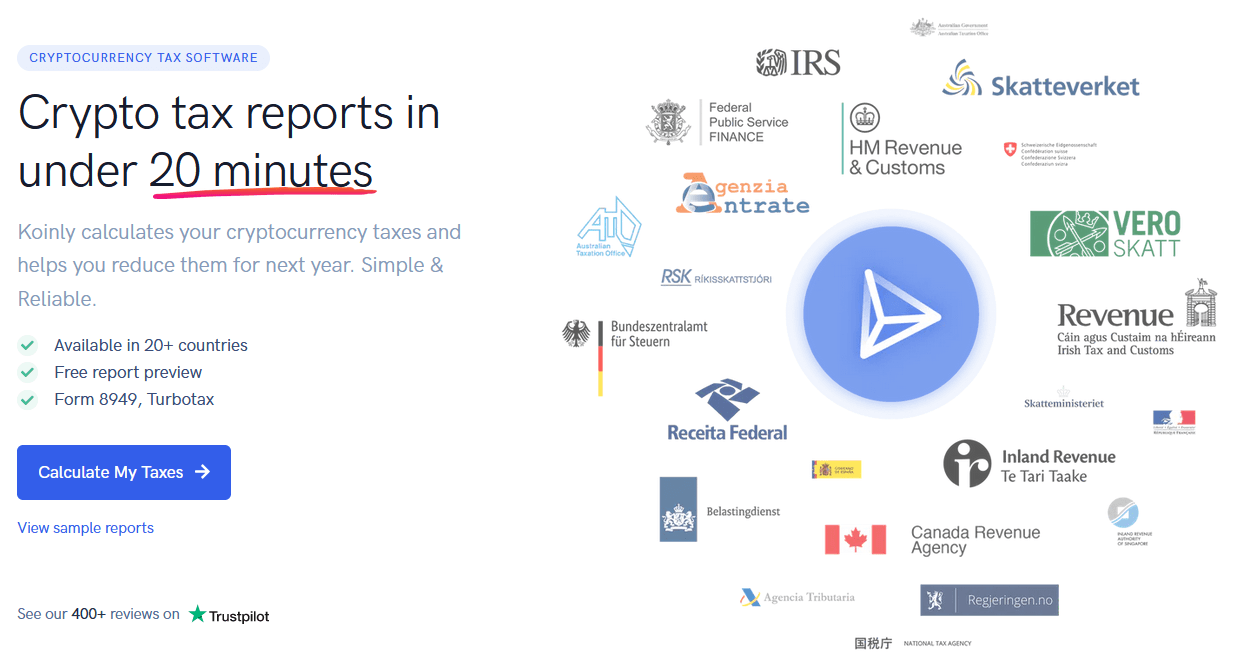Crypto tax software helps you take the pain out of manually calculating crypto taxes.
This guide will tell you which one is best for your situation to save you time and money this tax year.
Expert Advice: Before getting software, consult a tax accountant. Tax expert Ian Corzine claims that’s the best way to ensure you’re running tax software properly.

Fact Check: Before trying one of these software, properly check all tax claims with an accountant or CPA.
Useful Tool: If you only have a few trades, try our free crypto tax software calculators that we created ourselves:
| Software | Price Range | Integrations |
|---|---|---|
| Koinly | $49 to $400 per year | TurboTax, H&R Block, TaxAct. |
| CoinLedger | $49 - $299 per year | TurboTax, TaxAct, TaxSlayer and H&R Block. |
| Bitcoin.Tax | Not specified | TurboTax |
| CoinTracking | $156 per year | TurboTax |
| TaxBit | Not specified | Not specified |
| Cointracker | $59 - $199 (Advanced: $599) | TurboTax, HRBlock, 500+ exchanges/wallets |
| TokenTax | $65 per year (Advanced plans available) | TurboTax |
| ZenLedger | $0 - $149 per year (Advanced: $999) | Turbotax |
| CoinPanda | $0 - $189 per year | 800+ exchanges/wallets |
We made this simple tool where you can compare the Trustpilot scores of any of the software. (Scores as of October 2023.)

-
Koinly is an app that makes it easy to import your data and download capital gains tax forms like the 8949, and Schedule D and export to Turbotax. The web interface is pretty simple to use and supports the US, UK, Canada, Australia, and many other countries. Check the website for supported countries
Price range: $49 to $400 per year based on features and number of crypto transactions(1).
Koinly is the first on the list because it is, by far, the most simple crypto tax software that we have tried.
Koinly does make it very simple to prepare tax forms for your crypto activity, but it doesn't do much else (unlike CoinLedger outlined below).
For these reasons, I might recommend Koinly for users who need very minimal features and just want their tax software to produce tax forms quickly.
| Countries Supported | Integrations | Features | Forms | Trustpilot Score |
|---|---|---|---|---|
| 20+ | TurboTax, TaxAct | HMRC / ATO / CRA Report | Form 8949 & Schedule D | 4.8 |
| Countries Supported | 20+ |
|---|---|
| Integrations | TurboTax, TaxAct |
| Features | HMRC / ATO / CRA Report |
| Forms | Form 8949 & Schedule D |
| Trustpilot Score | 4.8 |

CoinLedger offers an easy way to calculate all your crypto taxes and has integration with TurboTax.
Price range: $49 - $299 per year based on the number of crypto transactions you made(2).
CoinLedger is very simple.
You'll go through a process of connecting all of your exchange accounts as well as your wallets to your CoinLedger account using API keys (don't worry, CoinLedger shows you how to do this for every single exchange). Once connected, you will import all of that data to your CoinLedger account. For US users, CoinLedger will generate Form 1040 and anything else you need.
If you don't trust CoinLedger to directly connect to your accounts, you can export the data from these wallets and exchanges as Excel sheets and import those sheets into your CoinLedger account.
All transactions go through 4 phases:
For these reasons, I recommend CoinLedger (formerly CryptoTrader.tax) to users who want to make filing their crypto taxes as painless as possible as well as bookkeeping. If you are not overly worried about granting access to your accounts to your accounting software, then CoinLedger is the software for you. I also recommend CoinLedger to anyone who is mining Bitcoin or other cryptocurrencies.
| Countries Supported | Integrations | Features | Forms | Trustpilot Score |
|---|---|---|---|---|
| USA, Canada, India, UK, Australia + 20 more | TurboTax, TaxAct, H&R Block, TaxSlayer | HMRC / ATO / CRA Report | Form 8949 & Schedule D | 4.8 |
| Countries Supported | USA, Canada, India, UK, Australia + 20 more |
|---|---|
| Integrations | TurboTax, TaxAct, H&R Block, TaxSlayer |
| Features | HMRC / ATO / CRA Report |
| Forms | Form 8949 & Schedule D |
| Trustpilot Score | 4.8 |

| Top Features | Free? | Integrations | Forms | Trustpilot Score |
|---|---|---|---|---|
| Adjusted cost basis and superficial losses (Canada). Pooling, with same-day and 30-day rules (United Kingdom) | Free tax report for up to 20 transactions | TurboTax®, TaxACT® and H&R Block® | Form 8949 & Schedule D | 4.1 |
| Top Features | Adjusted cost basis and superficial losses (Canada). Pooling, with same-day and 30-day rules (United Kingdom) |
|---|---|
| Free? | Free tax report for up to 20 transactions |
| Integrations | TurboTax®, TaxACT® and H&R Block® |
| Forms | Form 8949 & Schedule D |
| Trustpilot Score | 4.1 |
Bitcoin.tax is one of the oldest tools on this list. It was one of the first software.
We were early users of Bitcoin.Tax. However, in our recent testing of tools, it is clear that it’s become out of date. Other tools have now surpassed it to become more modern and quick.
Price Range: $156 per year
Integrations: TurboTax
| Clients | Users | Integrations | Forms | Trustpilot Score |
|---|---|---|---|---|
| Used by over 25,000 CPAs | 1+ million users | TurboTax | Form 8949 & Schedule D | 3.2 |
| Clients | Used by over 25,000 CPAs |
|---|---|
| Users | 1+ million users |
| Integrations | TurboTax |
| Forms | Form 8949 & Schedule D |
| Trustpilot Score | 3.2 |
Testimonial: CoinTracking is a comprehensive feature-rich finance, tax, accounting, and strategic planning crypto dashboard. - Kirk Phillips CPA, CMA, CFE, CBP, DCC & Author of “The Ultimate Bitcoin Business Guide”
Summary: CoinTracking is a crypto portfolio tracker and tax calculator that facilitates the management of digital assets, enabling imports from various wallets, blockchains, and legacy platforms. It supports a wide range of cryptocurrencies and provides features for bulk imports and custom price/NFT integrations.
Price Range: $75 - $600 USD per year
Integrations: All major crypto exchanges, wallets, and blockchains. Turbotax, TaxAct, H&R block, Form 8949, Form 1040.
| AI | Best For | Integrations | Forms | Trustpilot Score |
|---|---|---|---|---|
| Uses AI for calculations | Special focus on Defi and NFTs | TurboTax | Form 8949 & Schedule D | 3.2 |
| AI | Uses AI for calculations |
|---|---|
| Best For | Special focus on Defi and NFTs |
| Integrations | TurboTax |
| Forms | Form 8949 & Schedule D |
| Trustpilot Score | 3.2 |
Summary: Awaken is more expensive than some other software, but claims to have more features. It offers unique support for loans and staking. It also will give users credits if they show that other tax software generated taxes wrong.
Summary: TaxBit offers a premier end-to-end compliance and reporting solution for the digital economy, aimed at reducing manual work and improving operational efficiency through its API-powered platform for tax and accounting.
Our Take: In our experience, we find that TaxBit is more focused on companies and less on the average user.
Price Range: $59 and $199. $599 advanced plan available.
Integrations: TurboTax, HRBlock, and 500+ exchanges and wallets.
| Support | Best For | Integrations | Forms | Trustpilot Score |
|---|---|---|---|---|
| 10,000+ crypto assets | General tracking of crypto | TurboTax, OpenSea, Coinbase, H&R Block | Form 8949 & Schedule D | 4.1 |
| Support | 10,000+ crypto assets |
|---|---|
| Best For | General tracking of crypto |
| Integrations | TurboTax, OpenSea, Coinbase, H&R Block |
| Forms | Form 8949 & Schedule D |
| Trustpilot Score | 4.1 |
Summary: CoinTracker is a platform for automated crypto and NFT tax calculation and portfolio tracking. It generates tax forms within minutes with a notable level of accuracy, ensuring users stay compliant with crypto tax rules. The platform also offers features like automated portfolio tracking, tax loss harvesting, and mobile apps for on-the-go portfolio monitoring. Users can download tax reports swiftly and file them through TurboTax or their preferred accountants, with full support for the US, UK, Canada, and Australia, and partial support for other regions. CoinTracker is trusted by over 1 million users and is the official tax partner of prominent platforms like Coinbase and TurboTax.
Price Range: $65 per year. Advanced plans are also available.
Integrations: TurboTax
| Key Features | Best For | Integrations | Forms | Trustpilot Score |
|---|---|---|---|---|
| FBAR reporting | General tracking of crypto | TurboTax Online | Form 8949 & Schedule D | 4.8 |
| Key Features | FBAR reporting |
|---|---|
| Best For | General tracking of crypto |
| Integrations | TurboTax Online |
| Forms | Form 8949 & Schedule D |
| Trustpilot Score | 4.8 |
Summary: TokenTax offers automated crypto tax form generation and real-time reports, aiding in time-saving, preparedness, and strategic tax decision-making. We didn’t like that it only allows Coinbase for its cheapest plan and requires a $199 plan for other exchanges.
Price Range: $0 - $149 per year, $999 plan available for super-advanced traders
Integrations: Turbotax
Summary: ZenLedger simplifies crypto tax filing and portfolio tracking. It’s designed to handle DeFi, NFT, and crypto taxes, aiding in trade tracking and accurate profit/loss calculations to ensure users never overpay on crypto taxes.
Price Range: 0 - $189 USD per year
Integrations: 800+ exchanges and wallets including all major crypto exchanges, wallets, and blockchains.
Summary: Coinpanda assists in managing crypto taxes and portfolios, offering features like capital gains reports, futures and margin trading support, DeFi, NFTs, and staking tracking across 65+ countries. With 800+ integrations, users can import transactions, preview capital gains, and download tax reports effortlessly.
Price Range: Free
Integrations: All major crypto exchanges, wallets, and blockchains.
Summary: While Crypto.com’s service is free, there is usually a price. It does not offer as many features as the other software we’ve posted on our list.
Price Range: 0 - 249 EUR
Integrations: All major crypto exchanges, wallets, and blockchains.
Summary: We like Blockpit better for European users since the team is based in Europe. It likely offers more support for UK and EU users who are using smaller and less-known exchanges that the largest software don’t support. Accointing was recently acquired by BlockPit.
-
Short of moving to Puerto Rico or El Salvador, if you are taking profits on crypto, there is no way to get out of paying taxes on it.
That said, there are a few strategies to minimize your tax burden.
Crypto tax software is pretty simple - instead of having to calculate all the taxes you owe on all your trades or crypto income, you can input your data into crypto tax software and it will generate what you owe.
The software always supports Bitcoin, Ethereum, Litecoin, Defi, and nearly any other coin.
It will also hand that information over to your regular tax software, like TurboTax.
If you make lots of trades, most crypto tax software will connect to your exchange accounts and import the data for you.
If you have ever paid taxes on real estate or any other hard asset, then crypto works the same way. Any profits are taxed as capital gains.
That means you pay taxes on the difference between the price you bought the coins, and the price you sell them at. This is true whether you live in Canada, the US, or the UK, as well as many other countries.
You must report both profits AND losses. However, if you report losses, you may be entitled to reduce your crypto taxes in the future so it's actually in your interest to report these losses.
Yes, anytime you trade one cryptocurrency for another, you are effectively selling the first currency and buying the second one.
This creates either a profit or a loss for the first cryptocurrency and a new cost basis for reporting the second. Make sure to keep track of all crypto-to-crypto trades.
If you do not own the second wallet, then yes, you must pay capital gains on the coins you transferred since you are effectively 'selling' them.
If you own both wallets, there is no sale, and therefore there is no tax-reporting liability.
Even in 2023, most jurisdictions will not allow you to pay any taxes in crypto of any kind. There are a few places, such as the Swiss canton of Zug(7) and the US state of Ohio, among others, to allow residents to pay their taxes directly in Bitcoin. Overstock.com became the first US company to pay all of its taxes in Bitcoin(8). The state of Colorado is also looking into accepting Bitcoin(9) for tax payments.
BuyBitcoinWorldWide writers are subject-matter experts and base their articles on firsthand information, like interviews with experts, white papers or original studies and experience. We also use trusted research and studies from other well-known sources. You can learn more about our editorial guidelines.